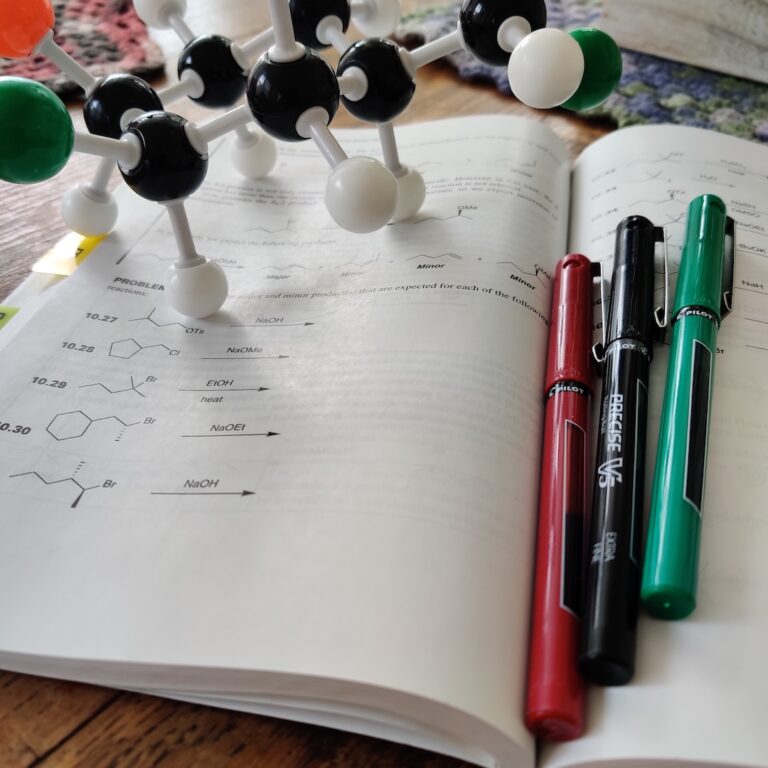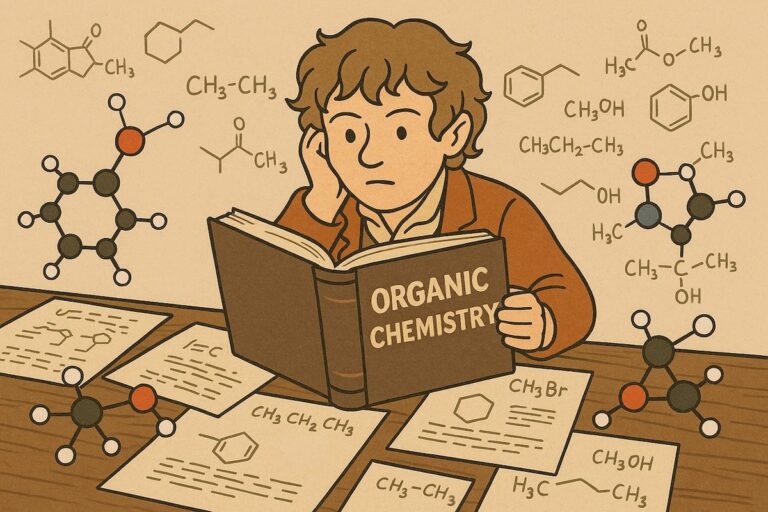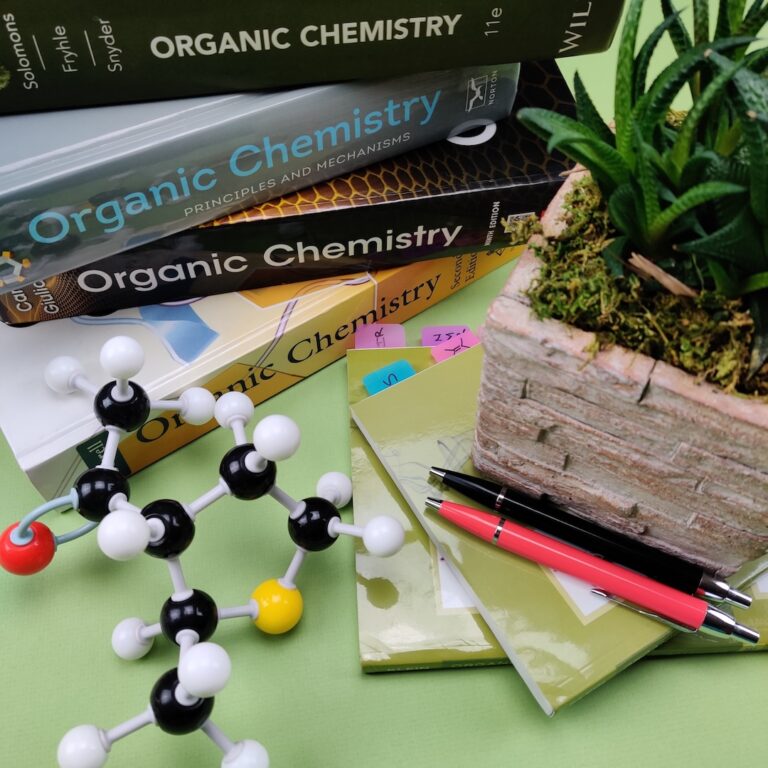Why Reading Organic Chemistry Textbook Before Class Is A Game-Changer
If you’re taking Organic Chemistry, you’ve probably heard the horror stories—brutal exams, endless reactions to memorize, and lectures that feel like they’re in another language. The truth? OChem is one of the most challenging college courses, but it’s not impossible. The key to success isn’t just working harder—it’s working smarter. And one of the smartest things you can do is read the textbook before class.
Many students try to absorb everything during the lecture, but that’s a losing strategy. Without a solid foundation, you’ll quickly fall behind, struggle to keep up, and spend more time feeling lost than actually learning. In this post, we’ll break down why Organic Chemistry is harder than your average college class, why just showing up to lecture won’t work, and how pre-reading and outlining can transform the way you learn—making OChem more manageable (and even a little enjoyable).
Ready to take control of your OChem experience? Let’s talk about the important points. 🔥
Organic Chemistry is Harder Than Your Average College Class – Here’s Why
If you’ve ever heard someone say, “Organic Chemistry is the class that weeds out pre-med students,” they weren’t joking. OChem has a reputation for being one of the most challenging courses in undergrad science programs—and for good reason. It’s not just about memorizing facts or following straightforward formulas. Organic Chemistry requires a deep conceptual understanding, pattern recognition, and critical problem-solving skills that many students haven’t fully developed yet.
1️⃣ Why is Organic Chemistry So Demanding?
Unlike general chemistry, which relies heavily on equations and calculations, organic chemistry is a language—a symbolic, visual, and conceptual system for understanding how molecules behave. Instead of plugging numbers into a formula, you have to:
✅ Visualize molecules in 3D and mentally manipulate structures.
✅ Recognize reaction patterns and apply them to unfamiliar problems.
✅ Predict reaction mechanisms by understanding electron flow and molecular interactions.
✅ Think critically rather than just memorizing isolated facts.
This shift from formula-based learning to a mechanistic and conceptual approach is what makes Organic Chemistry uniquely difficult for many students.
2️⃣ Why Just Sitting in Class Won’t Work
Trying to learn OChem just by listening to lectures is like trying to learn a foreign language by only watching movies in that language—without subtitles. Sure, you might pick up a few words here and there, but without actively engaging, you’ll struggle to grasp the bigger picture.
During lectures, professors move fast. They assume you’ve already read the material, so they focus on problem-solving, exceptions, and nuances rather than re-explaining the basics. If you walk into class cold, without any prior exposure to the topic, you’ll find yourself scrambling to keep up, frantically copying notes, and missing key connections.
By the time you figure out what’s happening, the professor has already moved on—and you’re left behind.
3️⃣ The “Snowball Effect” – Fall Behind, Stay Behind
Organic Chemistry builds on itself like a staircase. Each topic depends on a strong understanding of the previous one. If you don’t fully grasp resonance structures, you’ll struggle with reaction mechanisms. If you don’t understand acid-base chemistry, good luck making sense of nucleophilic substitution reactions.
Miss one concept early on, and it will haunt you for the rest of the semester.
The problem? OChem is not forgiving. Unlike some subjects where you can cram before an exam and still do okay, Organic Chemistry requires consistent effort and layered understanding.
You Need to Prepare Before Class
To succeed in OChem, passive learning won’t cut it. You need to actively engage with the material before the lecture even starts. That means:
✅ Reading the textbook ahead of time.
✅ Creating an outline of key concepts.
✅ Walking into class already familiar with the basics—so you can focus on understanding instead of playing catch-up.
Organic Chemistry isn’t impossible—it just demands a different learning strategy. The students who excel aren’t necessarily the ones with the highest IQ; they’re the ones who prepare, practice, and persist.
Let’s look at this strategy in more details.
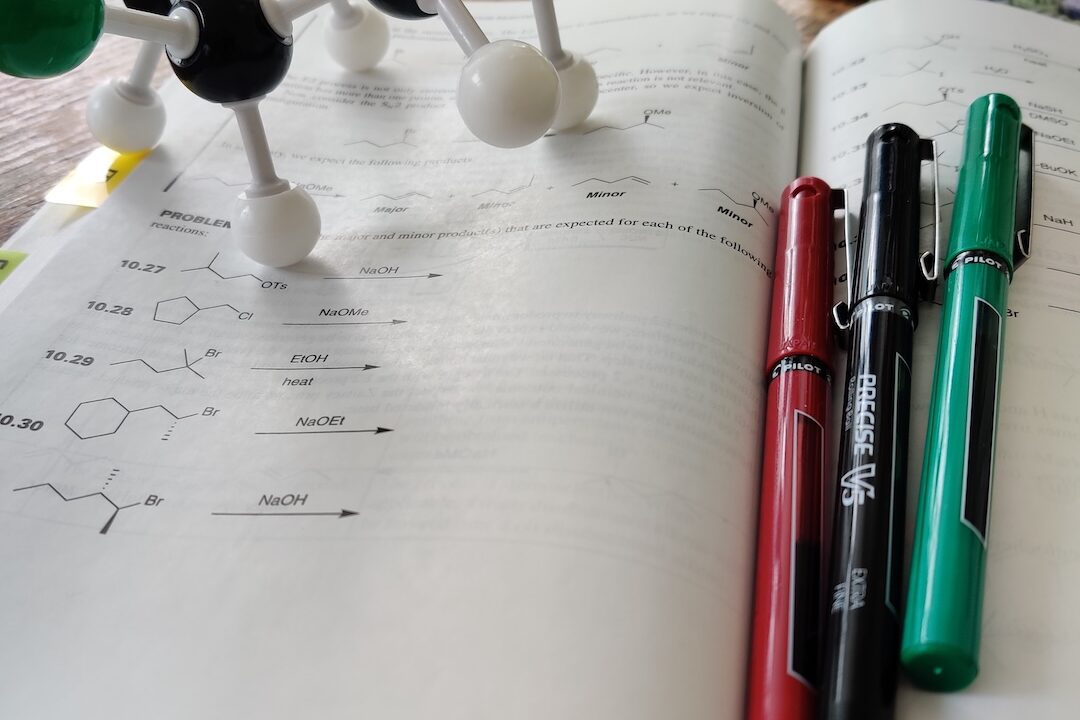
✅ The Solution: Read & Outline Before Class for Maximum Retention
Now that we’ve covered why just showing up to lecture won’t work, let’s talk about what does work: pre-reading and outlining before class. This simple shift in your study approach can completely transform your understanding of Organic Chemistry.
Instead of trying to absorb everything during the lecture, you’ll walk in with a solid foundation, allowing you to engage with the material at a deeper level. Here’s how to do it effectively.
1️⃣ Create an Outline Before Class 📖
Why? Because Organic Chemistry is a web of interconnected ideas. If you don’t know where a topic is headed, everything feels random and overwhelming. But with a structured outline, you can:
✔ See the big picture before diving into the details.
✔ Identify the core concepts and how they relate to each other.
✔ Use lecture time to fill in the gaps, instead of scrambling to take notes.
🔹 How to Create an Effective Outline
📌 Step 1: Skim the Chapter First
• Read headings, subheadings, and bolded terms to get an overview.
• Pay attention to figures and reaction diagrams—they often explain concepts better than words.
📌 Step 2: Identify Key Concepts
• Write down major topics (e.g., “Electrophilic Addition Reactions”).
• List important terms & definitions (e.g., “Markovnikov’s Rule”).
• Note reaction types & general mechanisms.
📌 Step 3: Keep It Simple & Structured
• Don’t copy everything word-for-word from the book.
• Use bullet points, tables, or concept maps for clarity.
• Leave space to add notes during lecture.
Here’s an example of how your pre-lecture notes might look like after you did your “homework” before you even enter the class:
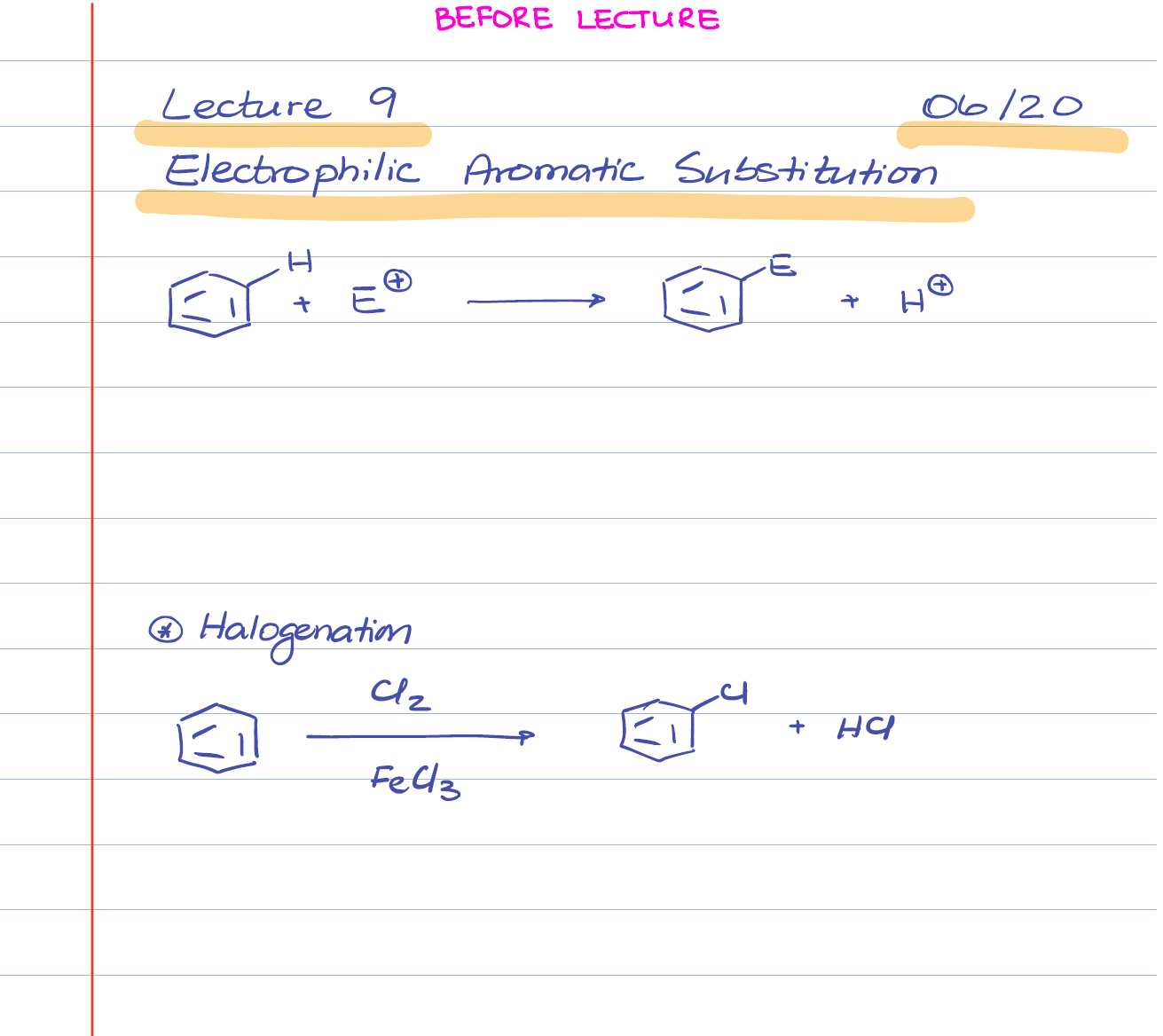
By the time you walk into class, you already have a roadmap of the material. You’re no longer reacting to new information—you’re reinforcing what you’ve already seen.
2️⃣ Fill in the Gaps During Lecture 📝
Once you have your outline, the next step is actively engaging during lecture. The goal is NOT to copy everything the professor says—it’s to build on what you already know.
🔹 What to Focus on During Lecture
✅ Clarifications & Explanations
• If the professor explains something differently than the textbook, write it down!
• If something didn’t make sense in the reading, ask questions.
✅ Exceptions & Nuances
• OChem is full of exceptions to rules—professors often highlight these in class.
• Example: “SN2 reactions happen in one step except when steric hindrance prevents backside attack.”
✅ Common Mistakes & Exam Tips
• If your professor says, “Students always mess this up,” star it!
• These hints tell you what’s important for exams.
✅ Additional Examples & Practice Problems
• The textbook may cover a concept one way, but your professor might show a different application.
• Write down any extra examples they discuss—especially reaction mechanisms.
At this point, your notes aren’t just a mess of disconnected facts—they’re an enhanced version of what you already studied.
So, here’s the same outline might look like after you’ve filled the gaps:
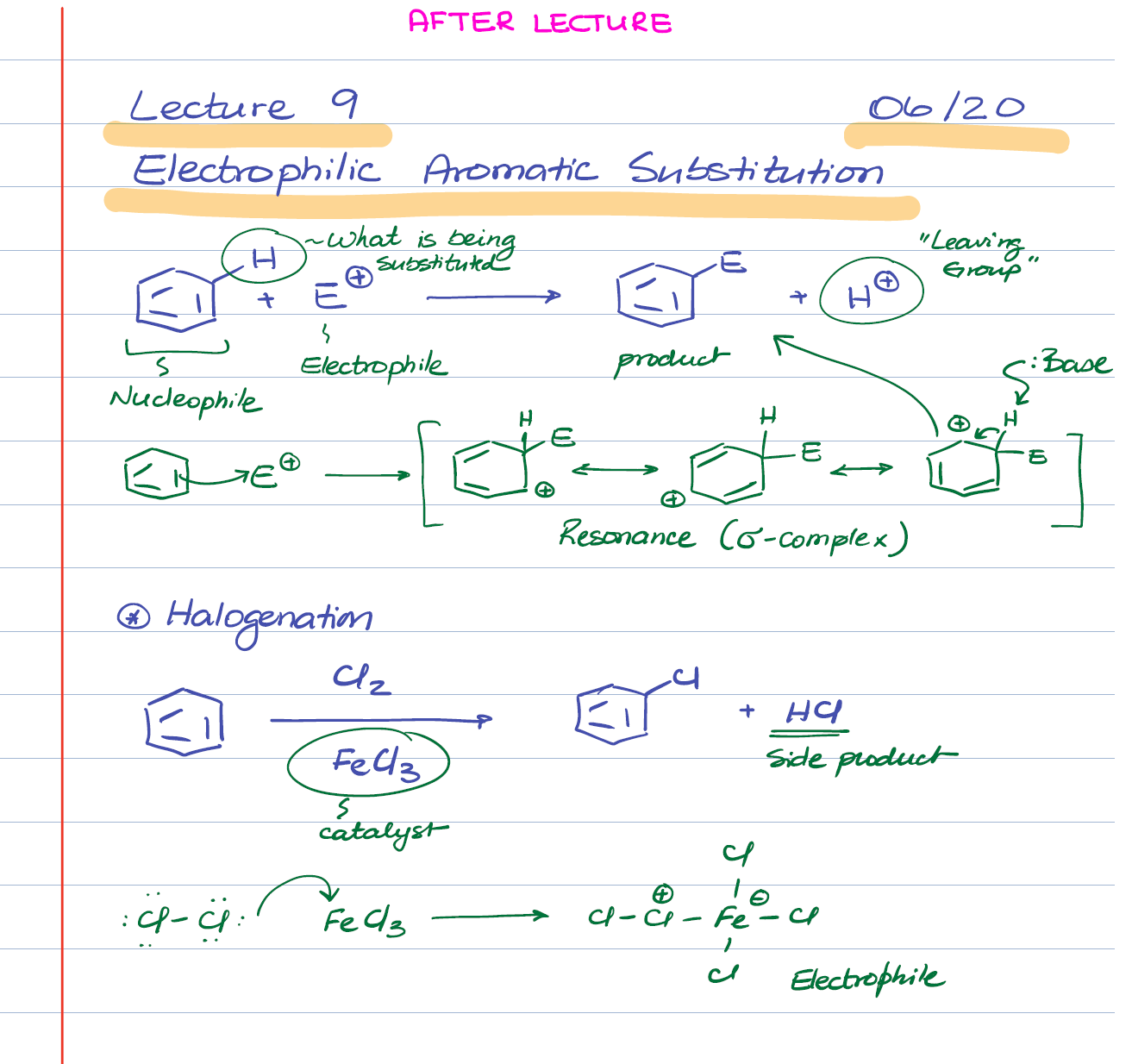
3️⃣ Don’t Copy Verbatim—Understand Instead ❌
Many students make the mistake of writing down everything the professor says without processing it. This is NOT effective!
Think about it—when you’re copying notes word-for-word, you’re not actually thinking about what they mean. Instead of mindlessly transcribing, try this approach:
🔹 Summarize in your own words – If you can explain it in simple terms, you understand it.
🔹 Draw connections – Instead of separate facts, see how concepts relate.
🔹 Use color-coding or symbols – Highlight key points for easy review later.
The goal is to leave class with a refined, personalized study guide—not just a pile of notes you’ll never look at again.
Read & Outline = Faster, Smarter Learning
Pre-reading and outlining before class saves time and improves retention because it shifts the way you learn:
❌ Passive Learning (Doesn’t Work): Show up unprepared → Get lost in lecture → Frantically copy notes → Spend extra time later trying to figure it out.
✅ Active Learning (Works!): Pre-read & outline → Walk into class with a foundation → Use lecture to clarify and deepen understanding → Retain concepts faster.
OChem is tough, but the students who excel aren’t necessarily the smartest—they’re the ones who prepare strategically.
So, are you ready to take control of your OChem experience? Start by pre-reading for your next lecture and see the difference for yourself!

